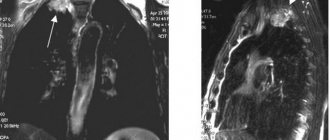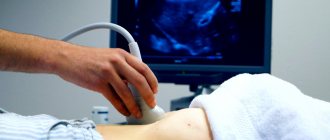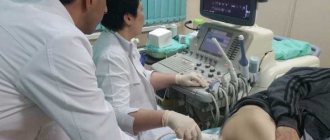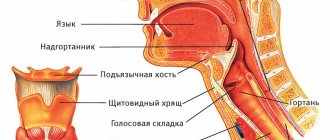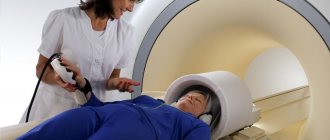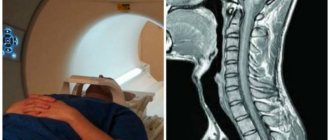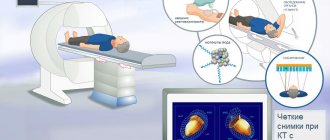Using magnetic resonance imaging, you can obtain an accurate three-dimensional image of various organs, which allows you to detect tumors, ulcers, vascular changes in them, and determine the cause of pain in the joints and spine. The method is harmless, which distinguishes it favorably from x-rays and computed tomography (which uses x-ray irradiation), so it is used even when examining children. MRI provides more information than ultrasound and does not injure the skin and organs (unlike biopsy or puncture). All these advantages make MRI an indispensable method of modern diagnostics. However, it has a significant drawback: during the procedure, the patient must lie motionless inside a tube with a diameter of 80 cm. Therefore, the question of how long the examination lasts is very important.
During the MRI procedure, the patient must lie motionless inside a tube with a diameter of 80 cm. Therefore, the question of how long the examination lasts is very important
How to prepare for an MRI of the brain?
MRI is completely harmless. The main thing is compliance with the rules of preparation and the study itself. MRI of the brain lasts 30-60 minutes.
The purpose of patient preparation is psychological calm, so that the patient is calm during the examination and does not move unnecessarily while inside the device. If a person is excited and nervous, the results will be incorrect.
Preparing for a head MRI includes the following steps:
- determination of indications;
- presence of contraindications;
- technical questions in consultation with a doctor;
- adjusting your diet and daily routine;
- selection of clothing for the duration of the procedure;
- psychological preparation of the patient.
The contrast procedure has a number of nuances. Testing is done to evaluate the patient's response to the contrast. Also, when performing an MRI, diet is important, so junk food and some medications are limited on the advice of a doctor.
For whom is MRI brain imaging with contrast contraindicated?
MRI should be performed for pregnant women in the first trimester. Practical observations of radiologists do not show the presence of complications in the fetus after the procedure. Clinical studies also rule out negative effects of magnetic fields on the human embryo. Medicine is an evidence-based science. There is no evidence of the absence of changes in the genetic background under the influence of magnetization. It is impossible to exclude changes in genes under the influence of a magnetic field. The impact of nuclear resonance on the human body requires further study. Expectant mothers are advised to refuse the study unless there are serious indications.
People with phobias of enclosed spaces should first inform a specialist about their fears. The devices have a closed circuit, which causes discomfort to people. In case of claustrophobia, the examination is performed in open-type installations with free sides.
Resolving settings is sufficient to resolve diagnostic issues. For scientific purposes, closed high-field models are used that are capable of detecting pathological changes measuring several tenths of a millimeter.
Patients with mental disorders are prescribed tranquilizers. The drugs relieve agitation and neurological diseases.
A prerequisite for magnetic resonance imaging is the removal of metal objects:
- Hairpin;
- Neurostimulants;
- Hairpin;
- Pacemakers (if possible);
- Vascular clips;
- Dentures;
- Ear installations;
- Heart valves;
- Jewelry;
- Hours.
Bank cards, watches, and mobile phones should be left outside the treatment room door. Metallic objects are removed during preparation for brain MRI.
Before scanning, the radiologist will definitely check that there are no metal objects in the body of the patient preparing for a head tomography. According to standards, it is better to do an MRI of the head in children under anesthesia to rule out the child’s mobility.
To exclude foreign bodies in the patient’s body, radiography is performed at the preparation stage. X-ray diagnostics is necessary to exclude metal fragments and bullet residues after gunshot wounds.
A referral from a local therapist or attending physician is a prerequisite for the examination. A specialist at the preliminary stage will not always correctly determine the indications and contraindications. The final decision always remains with the radiology doctor, who will indicate how to properly prepare for the examination.
Elimination of head mobility is achieved by preliminary fixation. The upper part of the body rises depending on the tomography plane. The duration of the manipulation is about 40 minutes. Depending on the purpose of the tomography, the correct position of the head is established. If necessary, the torso is rotated during tomography. Scanning is performed sequentially every few millimeters (depending on the capabilities of the equipment).
What should you not do before an MRI?
The specific diagnostic center where patients are examined sets its own requirements. But there are a number of general rules for patients before MRI:
- gentle diet (do not overeat);
- do not drink alcohol;
- women of childbearing age under 45 are asked to sign a document stating that they are not pregnant;
- The study is not advisable for young mothers during breastfeeding;
- During the study, the patient should not have metal objects.
Interesting: ESR norms for men and women in blood tests
Contraindications for MRI
All contraindications to MRI are divided into two groups: relative and absolute. The first say that the procedure can be prescribed, but subject to certain conditions. Absolute contraindications indicate a ban on performing this diagnostic method forever or for a long period. These include:
When performing MRI, contraindications must be taken into account, otherwise the results of the study will be
- decompensated heart failure (the last stage of development of heart failure);
- presence of an insulin pump;
- hemostatic clips (there is a possibility of their displacement during the study);
- pacemaker;
- built-in defibrillator;
- weight more than 120 kg;
- mental illness;
- claustrophobia (fear of closed spaces);
- the presence on the patient’s body of tattoos made of metal-containing coloring material (there may be infection);
- the patient's poor health.
You can pass if you have:
- artificial valves in the heart.
Relative contraindications for MRI
- patients taking nervous system stimulants;
- pins, prostheses, plates;
- first trimester of pregnancy;
- presence of an implant in the middle ear;
- installed Ilizarov apparatus;
- the presence of hemostatic intracranial clips.
Important: when performing MRI, contraindications must be taken into account, otherwise the results of the study will be unreliable and distorted.
Is it possible to eat before a brain MRI?
The doctor who supervises the patient tells the patient about all the features of magnetic resonance imaging, including permitted and prohibited foods before the magnetic examination. Eating before an MRI is not prohibited, but it is better to avoid the following drinks and foods:
- caffeine:
- energy;
- fat;
- spicy;
- spices.
Make sure you eat properly. Don't overeat or drink a lot of fluids. You cannot dramatically change your diet, but only adjust it, as the brain reacts to this, which will be reflected in the research results.
2 days before the test, eliminate foods that cause gas formation:
- bread;
- sweet pastries;
- grape;
- pear;
- onion;
- cabbage;
- peas;
- meat;
- kefir.
The last meal and drink should be no less than 3 hours before the test. When performing a procedure with contrast, avoid food 4 hours before. Limit yourself to light foods. It should be digested in time and not cause drowsiness.
How many MRIs of head vessels are performed?
To say how long the examination lasts, it is necessary to clarify an important factor - the quality of the resulting image.
If the time allocated for MRI diagnostics of the brain is reduced, the images will be obtained with insufficient information content. Duration is a significant indicator that influences the result.
There is no exact value that determines the time period required to obtain information when studying a particular site. The determining factor is the task set before starting the diagnosis, the type of organ/defect (tumor, edema, aneurysm). Visualization of a separate zone lasts approximately half an hour. A comprehensive MRI scan can last up to an hour. In certain situations, the procedure is made shorter.
If there is an urgent need for an emergency examination, MRI of the brain is performed promptly. It is not advisable to reduce the scanning duration.
When conducting an angiographic magnetic resonance examination, a coil is installed at the site where the vessels are scanned. During contrast-enhanced tomography, the drug is administered intravenously. The session involves complete immobility of the patient, the examination lasts 30-40 minutes.
Can I drink water before an MRI?
If this is a standard version of tomography, then there are no strict restrictions. If the examination is with contrast, then there are norms for drinking and eating.
You should not drink before the tomography:
- carbonated drinks;
- energy;
- tea;
- coffee.
If you drink these drinks the night before bed, they will cause insomnia, and the results of the examination will be unreliable.
You need to give up alcohol 48 hours in advance. It affects the biochemical reaction in the medulla, changes the lumen of blood vessels, leads to dehydration of the body and distorts the blood circulation process.
Interesting: What is the difference between a CT scan and an MRI of the brain?
Psychological preparation
The reliability of the MRI result depends on the state in which the brain arrives, on the course of biochemical processes in it and blood circulation. If a person is scared, irritated or nervous, then this will not bring any accurate result.
Preparation for the study is aimed at relaxing the patient and combating fears. The subjects, having learned that the procedure will not cause discomfort, calm down.
The doctor informs that the device is loud and you can use earplugs if necessary.
What categories of patients are contraindicated for MRI?
People who are diagnosed with:
- alcohol intoxication;
- early stage of pregnancy;
- psychological instability;
- severe general condition;
- epilepsy.
If a representative of one of these categories requires urgent diagnostics, which specialists cannot do without in the future, then they are allowed to undergo an MRI. At the same time, possible medical procedures are performed that ensure the safety of the special patient. A study with the introduction of gadolinium is contraindicated in case of an allergic reaction to this metal and renal failure. Taking into account all of the above recommendations is the key to a clear picture, which increases the likelihood of a correct interpretation of the diagnosis.
Use of medications
The use of medications before the procedure, even several days in advance, must be discussed with the doctor. If the specialist has given consent, it is recommended to repeat the same question to the radiologist to avoid risk. This is especially important if the examination is performed with contrast.
The reagents used during this procedure are safe, but they can react with medications, resulting in a risk of allergies, including anaphylactic shock.
Features of preparing children
Since magnetic waves are safe, the study is also performed in early childhood. Preparation rules are the same as for an adult.
The main thing is to prepare the child psychologically. The child must understand that it is important to remain calm and not move during the procedure. In rare cases, children are given sedatives or general anesthesia.
Infants are not given anesthesia, since they can be euthanized in another way, for example, by feeding them before the procedure.
If the newborn is bottle-fed, it is necessary to choose a formula that does not cause flatulence. Otherwise, the baby will move, which will lead to distorted results.
Interesting: MRI of the brain with contrast: indications and contraindications
